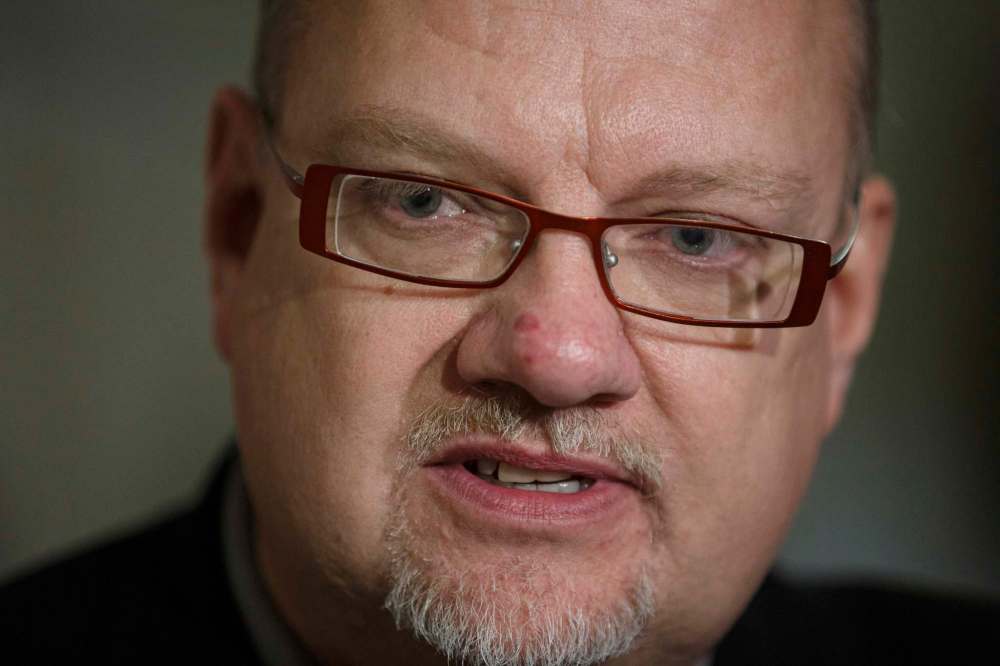Stacking board within St. Boniface Hospital rules: health minister
Catholic Health Corp. enlisted group to vote against assisted dying on premises
Advertisement
Read this article for free:
or
Already have an account? Log in here »
To continue reading, please subscribe:
Monthly Digital Subscription
$19 $0 for the first 4 weeks*
- Enjoy unlimited reading on winnipegfreepress.com
- Read the E-Edition, our digital replica newspaper
- Access News Break, our award-winning app
- Play interactive puzzles
*No charge for 4 weeks then billed as $19 every four weeks (new subscribers and qualified returning subscribers only). Cancel anytime.
Read unlimited articles for free today:
or
Already have an account? Log in here »
Hey there, time traveller!
This article was published 19/06/2017 (2500 days ago), so information in it may no longer be current.
Health Minister Kelvin Goertzen assured Manitobans there are “rules” in place to safeguard public accountability after a controversial vote about assisted dying at St. Boniface Hospital. And yet, Goertzen couldn’t or wouldn’t say what exactly they are.
“My understanding is that they are governed by rules and they have to follow those rules,” he said of the Catholic Health Corp. of Manitoba, which has complete operational control of St. Boniface, a publicly funded hospital.
The “process may not be what anybody would consider to be ideal,” Goertzen told reporters Tuesday in Selkirk, “but they have followed their rules.”

In late May, the hospital’s board met to consider a policy around assisted dying that would allow on-site health-care workers to direct patients interested in the service to the provincial team. At the meeting, the policy was amended to allow assisted dying in “rare circumstances” on the premises.
The Catholic Health Corp. later added 10 new board members directly from its own board and forced a re-vote to keep with the corporation’s Catholic roots. The move prompted the St. Boniface board chairman to resign and drove the hospital’s outgoing president of medical staff, Dr. Marcus Blouw, to publicly air his concerns despite a confidentiality pledge.
For the hospital to decide transfers to other sites for assessments was harmful to patients but transfers for the procedures were acceptable felt, Blouw said, “like a double standard.”
“They are knowingly forcing people into a situation where the patient has to decide, ‘I either transfer sites with the very real potential of harm occurring in that process or I stay here.’”
Both the corporation and the Winnipeg Regional Health Authority, which supplies staff and funding to St. Boniface, said its operational control was enshrined in a 1996 faith-based agreement with the provincial government. The government said reporters must request the documents through the Freedom of Information Protection Act.
When asked directly by the Free Press to release the information, Goertzen declined.
“The FIPPA process is to ensure that we follow the rules,” he said. “That process isn’t intended to keep information from the media or the public.”
The minister focused the bulk of his remarks Tuesday on the delicate balance the province has struck to ensure access to the service while not forcing health-care providers to violate their conscience rights.
When pressed about an internal St. Boniface staff memo revealing many health-care workers at the hospital do in fact wish to provide assisted dying on site, Goertzen said: “We’ve struck the middle ground by ensuring there’s balance… we ensure that there’s respect for individual facilities and we ensure that people who want the procedure get it.”
However, there is no enshrined protection of institutional rights of conscience and critics have repeatedly said health-care facilities that receive public funding should not be allowed to opt out of providing services.
You don’t choose a hospital because its Catholic, said Dr. Ellen Wiebe, a clinical professor at the University of British Columbia who not only provides assisted dying but has written editorials about B.C.’s faith-based agreement.
“You’re going there because it provides general health care and for a number of specialities it’s the only place here within the province that you could go to,” she said. “If you need hospice, you don’t have choices — you get the place with the next bed and if that’s Catholic, then you’re out of luck.”
St. Boniface is Manitoba’s premier location for patients needing palliative care.
“Our clinical teams will continue to support patients who require compassionate end-of-life care,” St. Boniface chief executive officer Dr. Bruce Roe wrote in internal memo Monday to all staff (and provided to the Free Press).
In it, Roe said details on the facility’s new assisted-dying policy “with plans for implementation and communication, will be shared in the coming weeks.”
jane.gerster@freepress.mb.ca
Twitter: @Jane_Gerster
History
Updated on Tuesday, June 20, 2017 6:53 PM CDT: Full edit





